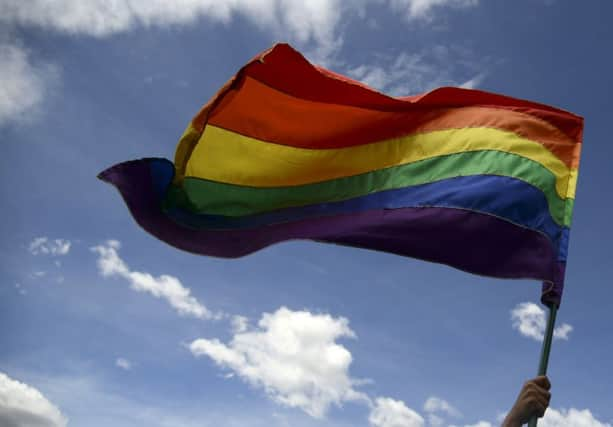Jane Bradley: Time we all got over the rainbow


The initiative, “Support Pride”, has become a Facebook must-do for those who, like me, are in support of gay marriage. Many, many people have done it. Over a million, worldwide.
Of course, as with any of these things, the conspiracy theorists out there have claimed that it is part of a scam – a massive Facebook experiment masterminded by Mark Zuckerberg himself, who is sitting in his lair, rubbing his hands with glee that he can use this apparently socially-forward initiative to acquire even more data on his helpless users. I really don’t care about any of that, true or not.
Advertisement
Hide AdAdvertisement
Hide AdBut I still haven’t changed my profile picture to a rainbow.
I have, of course, felt the pressure – I have worried that by not doing it, friends, both gay and straight, would assume that I am anti-equal marriage, which I am most certainly not. But the idea of jumping on the rainbow bandwagon left a bit of a funny taste in my mouth.
A massive proportion of my friends have gone rainbow. Some of them even live in America, that country which is actually ruled by the Supreme Court. And therein lies the rub for me – I am not American. While I am over the moon that Americans in every state will now – as my Maryland-dwelling cousin and his now-husband did last year – be able to marry whoever they like, I find leaping around excitedly about something which has happened, not here, but in a foreign court – which has no jurisdiction over us and our actions whatsoever – a little strange.
What is more, here, in Scotland, the country that I live in, equal marriage has, thankfully, already been in force for some time. The latest figures show that a total of 462 Scottish couples tied the knot in the first three months since the legislation was changed at the turn of the year.
Marriage equality here was brought in last December, while in England and Wales, same sex weddings have been legal since March 2014. When British legislation changed, did millions of people the world over run out on to the streets to celebrate? Did they change their Facebook profile pictures to a rainbow version of a Saltire or a Union Jack? No, they did not.
Why? Because while we apparently care enormously about America and what they get up to, they really, really don’t give a ha’penny about us.
It’s not meant to be a criticism and it’s not really their fault: they’re part of a very big country with a lot to concern themselves with and we are very small.
But when, in reply to a post of mine about September’s referendum, a very well-educated American friend admitted innocently that she had assumed that Scotland was already a separate country with full independence from the UK, it made me realise what little interest America generally has about what goes on outside of its borders. Little interest, that is, until we are expected to celebrate something which should, really, mainly be a nationwide victory for them.
Advertisement
Hide AdAdvertisement
Hide AdIt’s partly the fault of the popular media: in Britain, we almost feel like we ARE American. Homegrown films account for just 20 per cent of the market in the UK, according to the 2014 British Film Industry Statistical Yearbook. The vast majority of the rest are American, while we spend our evenings binge-watching TV series made by HBO. Even my three-year-old sings the songs from Frozen with a pseudo-American twang.
Any British film-viewer could easily translate a sentence along the lines of “The kid in that stroller on the sidewalk is wearing pants”, while their American counterpart would seriously struggle with “The wean in that buggy on the pavement is wearing trousers”.
Of course, the Supreme Court judgment was significant because America is so big and so important and its decision could have a knock-on effect to other nations which have not yet taken the leap themselves. But that in itself is a vicious circle. America is partly so powerful because other countries allow it to be – looking to the White House for confirmation that what they are doing is right – which just can’t be right.